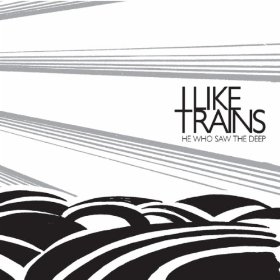It’s prickling the senses ever further; our time on Earth is drawing to a close. And while we rage and argue over whether we could’ve done more to avert the slide and whether we still can the clock ticks on, each drowning island or destitute seabed an indication that the tightrope we all walk is snapping strand by strand. The eventual fall will not be pretty, but nor will it be the instant global event portrayed in films and on television; many would argue that our demise has already started.
It’s this overwhelming backdrop that influences He Who Saw The Deep, and there could be fewer more appropriate soundtracks for the last vestiges of men. There’s no tumultuous fanfare here, no fire and brimstone or unshakeable anxiety; just a mournful resignation that our time dwindles. We humans are a mere irresponsible spec on the universe’s great expanse, fools for not having done all we could to lengthen our stay, but ultimately overpowered by greater parts, as we always would be.
Yet there’s an acceptance of such events here that imbues proceedings with a steely calm, the group’s lead front man Dave Martin proving, as ever, a reassuringly sturdy baritone in the eye of a particularly apocalyptic storm. As such there’s an almost observational nature to lines like "as Europe slips into the sea," and a serenity of clarification in the way he watches over unfolding events with a weary gaze and rumpled frown lines. The result is an understated apocalypse of real beauty, our last gasps played out with a juxtaposed intimacy.
That the Leeds group return as bleakly minded as on 2007’s Elegies To Lessons Learnt is of no surprise; but beyond that there has been much change, as indeed there had to be with the group in danger of being known as one – admittedly impressive – trick historical post-rock ponies. By and large the distant past has been checked in and left behind; there are still backward looks but they’re regretful glances, a grave awareness of previous events impacting on a future punctuated with a rapidly approaching final point. On ‘When We Were Kings” chiming guitars Martin oversees the last days of mankind’s prosperity admitting "as the storms about us rose we were busy making plans, plans to keep ourselves afloat," while ‘Hope Is Not Enough’ offers the forlorn lament that "we slept soundly in our royal beds as the walls came crashing down." The centre piece of this sustained remorse comes during the aptly named ‘Sea Of Regret,’ a stirring eight minutes that gradually draws voices and instruments together in one momentum-building ball of slow burning energy. It’s the sort of string laden crescendo that I Like Trains do so well, it’s thudding percussion driving the band towards a succinctly executed explosion before falling away with a deftness that hoodwinks you into questioning if it was ever there.
If ‘Sea Of Regret’ still comes across as a familiar turn from the four-piece, then elsewhere things are markedly different. The reduction to a quartet for one thing, while unplanned, has resulted in a leaner, more concise sounding outfit; the opening brace of songs rattle along with surprising tempo and the endless swathes of reverb that dared guitars to creep out amongst it have been swept away. Instead everything sounds closer to the surface; vocals sit at the forefront for the most while instrumental hooks and melodies ring clearer and more distinctly, delicately positioned side by side the album’s aching strings rather than left to cling together and teeter dangerously on the edge of vast vacuums of space. The resulting effect is that tracks like ‘Progess Is A Snake’ and ‘Broken Bones’ possess a refined quality that one might not have thought possible for this band amongst their preceding slabs of foreboding sound.
"This is the way the world ends: Not with a bang but a whimper" wrote T.S Eliot, and so this is how I Like Trains view their own version of Armageddon; not as a result of some raging totalitarian or police state but from the lurking alterations of nature that have become glaring to us far too late. Yet while He Who Saw The Deep‘s lyrical content is steeped in sorrowful expectancy, it’s delivered on the buoyant wings of a subtle majesty, suggesting that far underneath this dark soothsaying lies a far simpler truth: that the band are enjoying making music as much as they ever have, and have fought hard – following a label drop and a member loss – to clamber their way back into the reckoning. This may not even yet mark the peak of their ascent, but it allows them a fine vantage point nonetheless from which they can continue to preside over our end of days.


